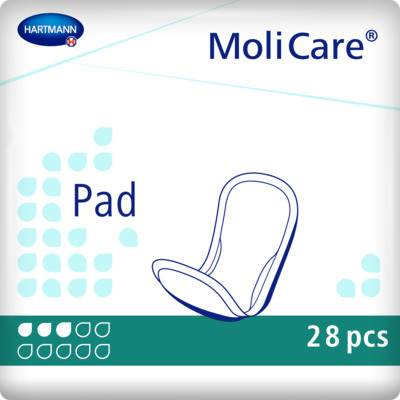Active living
How Many Times A Day Should You Wee
How often should you visit the toilet? The question of how many times a day should you wee is mainly connected to our health. In this article, you will find out how many times you should wee a day, as well as learn about the correlation between urinary frequency and overall well-being. We will also explore how certain foods and supplements influence bladder activity, and provide guidance on when to seek professional advice.
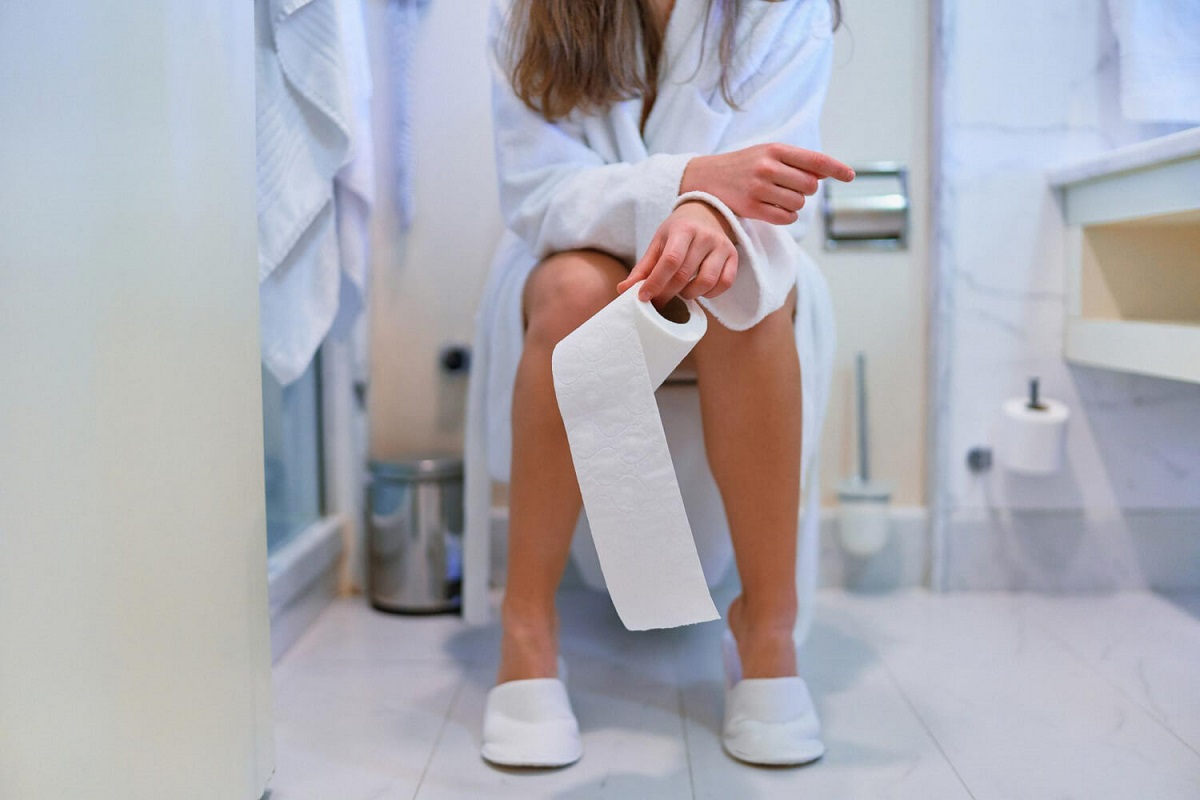
The Correlation Between Urinary Frequency and Health
Understanding how many times you should pass urine isn't just about numbers—it's a reflection of your health and toilet habits. While urinating around six to seven times in a 24-hour time span is normal for many, this can vary based on several factors:
- Age: As we grow older, our bladder's capacity can change, affecting how often we feel the urge to urinate.
- Fluid intake: The amount and type of liquids you consume play a significant role. Naturally, the more you drink, the more you'll need to urinate.
- Types of drinks: Beverages like coffee or alcohol can act as diuretics, increasing the volume of urine produced.
- Medical conditions: Issues like diabetes or a urinary tract infection (UTI) can influence urinary frequency.
- Medication usage: Some medicines can increase or decrease urine output.
- Bladder size: Everyone's bladder size is different, affecting how much urine can be held in the bladder until you feel the need to urinate.
While it is common to urinate more or less than the average amount on certain days, exceeding this range might require attention.
How many times a day should you wee?
- Source
- Impact of Pregnancy on Urination
- The Correlation Between Urinary Frequency and Health
- Understanding Urinary Tract Infections and Factors Affecting Urination
- Pregnancy and Urination
- Urinary Retention
- Diabetes and Urination
- Potassium Levels
- Medications and Urination
- Natural Diuretics
- Sickle Cell Anaemia
- Congestive Heart Failure
- Tachycardia and Urination
- Post-Medical Procedures
- Alcohol and Caffeine
- Hydration and Urination
- Factors Influencing Urination Patterns
- Increased Urine Output
- When to Seek Medical Advice
- Tips for a Normal Urine Output
- How Water Become Urine
- Keeping Track Of Your Urine Frequency
- FAQs
Understanding Urinary Tract Infections (UTIs) and Factors Affecting Urination
A UTI is a condition that can significantly influence your urination frequency. While anyone can experience a UTI, it usually affects women more.
Symptoms include an intense urge to urinate, even shortly after emptying the bladder, and a burning sensation when passing urine. If you suspect a UTI, consult your GP.
The Impact of Pregnancy on Urination
Pregnancy can cause alterations in urination patterns, and there is a correlation between pregnancy and incontinence. The growing foetus can put pressure on the bladder, and may cause a greater urge to urinate. After childbirth, the frequent need to urinate can persist for some time due to fluids introduced during labour and the body's natural fluid regulation after birth.

Urinary Retention:
This condition arises when you cannot empty your bladder. Symptoms include the continuous urge to urinate, lower abdominal discomfort, and increased urination frequency. Urinary retention can be caused by neurological issues, infections, or bladder muscle problems.
Diabetes and Urination:
For those with diabetes, you may find yourself urinating more frequently. This increased frequency is the body's way to eliminate surplus sugar from the bloodstream. Alterations in urine frequency can occur if your body's glucose levels are either too high or too low.
Potassium Levels:
A deficiency in potassium can hinder the kidneys' urine concentration capability, potentially leading to heightened thirst or urination.
Medications and Urination:
Certain medications, especially diuretics, can increase how many times a day you urinate. These medicines assist the kidneys in filtering more fluid into the urine. They're often prescribed for conditions like hypertension or heart issues.
Natural Diuretics
Certain foods, drinks, and supplements have natural diuretics properties that increase urine outflow, and therefore, reassure you about how many times you should urinate a day. Some notable examples include:
- Caffeine: Found in coffee, tea, hot chocolate, and energy drinks.
- Natural herbs and foods: Dandelion, hawthorn, horsetail, juniper, both green and black teas, parsley, hibiscus, watermelon, grapes, berries, and celery.
Sickle Cell Anaemia:
Sickle cell disease can affect the functioning of your kidneys.
Impaired kidneys can't filter fluids properly, leading to increased urine production, other kidney complications and, consequently, more urination.
Congestive Heart Failure:
Congestive heart failure can cause people to struggle to release excess fluid.
When resting, especially at night, the body might produce more urine to counteract this fluid buildup, which may lead to nocturnal enuresis. If so, be sure to use incontinence bed protection to maintain comfort when asleep.
Tachycardia and Urination:
Tachycardia refers to an unusually rapid heartbeat. When a person experiences tachycardia-polyuria, which is defined by a heartbeat exceeding 120 beats per minute (bpm) for over half an hour, it can lead to increased urination.
Post-Medical Procedures:
Undergoing tests that involve dye injections, like CT scans, might temporarily boost how many times a day you urinate.
Alcohol and Caffeine:
Both alcohol and caffeine can induce diuretic effects and cause an abnormal urine output. While this increased urination isn't typically indicative of a health concern, it's essential to be aware of the diuretic properties of these substances.
Instead, you could opt for these bladder-friendly drinks that will positively impact your urine.
Hydration and Urination:
The more water you consume, the more you'll need to urinate.
Staying hydrated is vital for numerous bodily functions, but it naturally leads to an increase in the number of times you pass urine a day.
Factors Influencing Urination Patterns:
There are many factors that can influence urination patterns, including:
- Overactive thyroid (hyperthyroidism): Leads to symptoms like increased urination, restlessness, increased appetite, sleep disturbances, and difficulty concentrating - all of which contribute to the number of times you pass urine a day.
- Anxiety's impact on urination: Anxiety can cause bladder muscle contractions.
- Interstitial cystitis: Otherwise referred to as chronic bladder inflammation. Symptoms include frequent urination, unexpected urine leakage, abdominal or pelvic pain, and an urgent need to urinate.
- Multiple myeloma: A rare blood cancer causing elevated glucose levels.
- Primary aldosteronism (hyperaldosteronism): Excess aldosterone hormone production can lead to sodium retention and potassium excretion, causing frequent urination.
- Polycystic kidney disease: This is a genetic disorder which causes cysts on the kidneys.
- Kidney stones: This can cause infrequent urination, urinary pain, urgency, cloudy urine, fever, and chills.
- Age: This can be a key component in how many times you urinate, particularly in children and older adults who can struggle to maintain control over the bladder.
- Exercise: Participating in daily exercises will increase the likelihood of urinating more often due to drinking more water after sweating.

Increased Urine Output:
In men, the prostate can greatly influence urinary output, not only increasing the number of times a day that you urinate, but also, if you have had surgery, incontinence after prostate surgery. The state of your prostate is also one of seven bladder problems in men, so be sure to recognise the impact your prostate may have on your urine output.
When to Seek Medical Advice:
If you are concerned about how many times a day you pass urine, and it is disrupting your daily activities, consult your GP as soon as possible. Make sure to inform them about the frequency of your urine, short or long bursts, and other factors such as colour, which will play an important role in your diagnosis.
Tips for a Normal Urine Output
A healthy urinary tract is essential for maintaining normal urine output and understanding how many times a day you pass urine. Here are some practical tips to minimise urinary and genital irritation:
- Consume probiotic-rich foods: Eat foods that are rich in probiotics, particularly lactobacillus. These chemicals can be found in yoghurt and kefir. Lactobacillus may benefit women who are prone to have recurrent UTIs.
- Incontinence pads: As a general health tip, we advise using incontinence products if you are concerned about urine leaking or interfering with your daily activities.
- Comfortable clothing: Choose loose, cotton underwear and avoid tight clothes such as tight jeans or leggings.
- Regular urination: Aim to urinate every three to four hours; there is no need to hold back. If you need to use the toilet more often, and are worried whether weeing every two hours is normal, consult your GP for further advice.
- Stay hydrated: Drinking eight glasses of water is recommended to ensure that you stay hydrated and to wash out unwanted chemicals from the body.
- Limit bladder irritants: Minimise consuming alcohol, fizzy drinks, and caffeine. Steer clear of bladder irritants like artificial sweeteners and cigarettes.
How Does Water Become Urine?
The amount of urine that you produce a day can be affected by how much fluids that you intake. The urinary system plays a crucial role in converting water into urine. This liquid comprises surplus fluids and waste products the body doesn't require. The duration it takes for water to transform into urine can vary from person to person.
The kidneys produce urine and control the rate of speed it is produced. The urine then travels to the bladder. Factors like liquid intake and certain medical conditions can impact this process.
Incontinence Products for Women
Check out our incontinence products for women
Keeping Track of Your Urine Frequency
Knowing how many times a day you should pass urine is more than just a routine exercise. While it is not an immediate cause for concern, it's a reflection of your health and well-being. Of course, urinary frequency is affected by your diet, various medical conditions, hydration levels, and even your daily lifestyle. By keeping track of how often you pass urine, you can maintain peace of mind and seek professional help if your output reduces or increases with no obvious cause.
FAQs
Is it normal to urinate every two hours?
For many people, it's not uncommon to urinate every two to four hours when awake. The frequency of urination can be influenced by various factors, including fluid intake, the types of fluids consumed (e.g., caffeine or alcohol can increase urination), age, bladder size, and sensitivity. However, if you find yourself needing to urinate more often than usual without a clear reason (like increased fluid intake), it could be a sign of an underlying condition, such as a urinary tract infection, an overactive bladder, or diabetes.
Is it normal to only wee three times a day?
The average person typically urinates between four and ten times a day. Urinating only three times a day can be normal, if you have a lower fluid intake. However, constantly urinating less than three times a day or having dark, concentrated urine might indicate dehydration or another underlying condition.
Sources
NHS. (n.d.) Supraventricular tachycardia. [online] Available at: https://www.nhs.uk/conditions/supraventricular-tachycardia-svt/ [accessed 27/09/23]
Sickle Cell.com (2021) Kidney Problems and Sickle Cell Disease. [online] Available at: https://sickle-cell.com/complications/kidney [accessed 27/09/23]
NHS. (n.d.) Sickle Cell Disease. [online] Available at: https://www.nhs.uk/conditions/sickle-cell-disease/ [accessed 27/09/23]
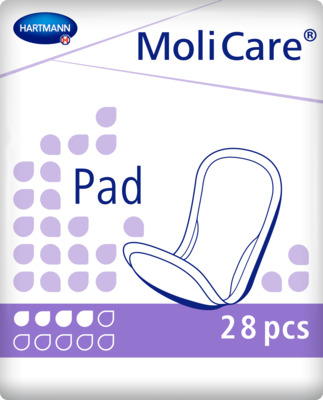
MoliCare Pad 4 Drops
<h2>Handy MoliCare Pad 4 Drops to Carry on the Go</h2> <p>Our MoliCare® Pad 4 Drops are an essential product for those experiencing slight incontinence, allowing you to regain control and live your busy and active life without the interference of bladder weakness. Designed for both men and women, this pad for men and women offers exceptional dryness and protection, ensuring your comfort and confidence.</p> <h2>‘Barely There’ Reassurance and Reliability</h2> <p>The MoliCare® Pad 4 Drops are slimline, discreet, and adjusted to fit your body seamlessly. It fixes securely inside your underwear, providing a ‘barely there’ comfort feel. With its soft and skin-kind fabric, along with a wide adhesive fixing strip on the backsheet, you can go about your day with the assurance of being protected against leakages.</p> <p>The absorbent core effectively prevents your skin from becoming too moist, while the elastic anti-leak edging adds an extra layer of security and peace of mind. Say goodbye to any worries about odours, as the MoliCare® Pad 4 Drops also neutralises odours to keep you fresh and confident throughout the day. Don't let incontinence hold you back from living life to the fullest.</p> <p>Ordering your MoliCare® Pad 4 Drops is hassle-free, as we offer fast and discreet delivery direct to your door. With our price match promise, you can trust that you're getting the best value for your money. Plus, enjoy free delivery on all orders over £40.</p> <p>If you need assistance in finding the perfect incontinence product for your needs, our friendly customer care team is here to help. Don't hesitate to reach out to us at 0800 028 9470. Take control of your life with the reliable protection and comfort of the MoliCare® Pad, alongside other <a href="https://www.hartmanndirect.co.uk/incontinence-products/incontinence-pads" style="color:#0563c1; text-decoration:underline">incontinence pads</a>.</p> <p> </p>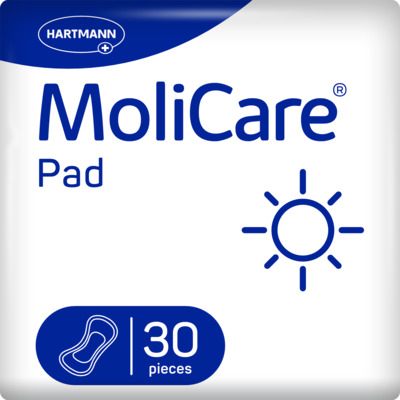
MoliCare Pads for Day
<h3>Incontinence pads for protection during the day </h3> <p>Even slight bladder weakness can be a burden in everyday life. There is a simple and affordable solution for this: MoliCare® Pad Day delivers discreet, reliable protection that helps you manage life’s daily challenges. </p> <p>The highly absorbent core inside the incontinence pads quickly locks away urine to ensure a pleasantly dry feeling on the skin. At the same time, it neutralises unpleasant odours. </p> <p>MoliCare® Pad Day are designed for discreet protection during the day. You can recognise the daytime incontinence product by the sun symbol on the packaging. They complement MoliCare® Pad Night incontinence pads which provide reliable protection at night. </p> <h3>Who is MoliCare® Pad Day suitable for? </h3> <p>MoliCare® Pad Day incontinence pads are suitable for people with mild bladder weakness. They leak anywhere from a few drops to 100 ml of urine between visits to the toilet. </p> <p>Incontinence pads are suitable for active women and men users whose mobility is not restricted. They can go to the toilet independently and without assistance. </p> <h3>Cheap incontinence products: comfortable, discreet protection </h3> <p>The incontinence pads have a highly absorbent core and odour control to keep you feeling fresh and comfortable. Thin and flexible, MoliCare® Pad Day are designed to be discreet, invisible under your clothing. Thanks to the wide adhesive strip, they remain securely in place even during sport. The incontinence pads are made from soft, breathable material so you feel comfortable all day. </p> <p>You usually need no more than two MoliCare® Pad Day incontinence pads during the day and one MoliCare® Pad Night incontinence pad for undisturbed sleep. This gives you a low cost yet high-quality round-the-clock supply of incontinence pads from HARTMANN. </p> <h3>We are HARTMANN </h3> <p>MoliCare® is HARTMANN’s extensive range of continence care. For over 40 years, we have been developing effective, reliable products that help people manage the challenges of living with incontinence. Our aim is to provide the right solution for every need. </p>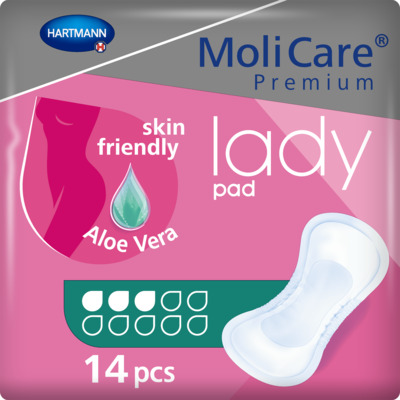
MoliCare® Premium Lady Pad 3 Drops
<h2>Lightweight Incontinence Solutions</h2> <p>The MoliCare® Premium Lady Pad 3 Drops is the perfect solution for women who are looking for a slim, discreet and comfortable way to manage slight bladder incontinence situations. The pad is small and lightweight, so it's easy to carry with you on the go. And the odour neutralisers help to keep you feeling fresh and confident all day long.</p> <p>With a fast and reliable delivery, you can apply your MoliCare® Premium Lady Pad 3 drops in next to no time. With their compact appearance, they are easy to apply and are barely noticeable when fitted under your underwear. For extra skin-friendly protection, we equip these products with Aloe Vera to maintain a healthy skin, as well as absorbent and secure technology. It is truly one-size fits all with this range!</p> <h2>Maintain peace of mind</h2> <p>These lady pads contain 14 pieces per bag, are set at an affordable pricing, and will prevent leakages, maintaining peace of mind in all social situations.</p> <p>If you require additional information, do not hesitate to get in touch with our reliable customer service team, who are ready on hand to answer your questions. If you're looking for a reliable pad that will help you stay dry and comfortable, the MoliCare® Premium Lady Pad 3 Drops is a great option. Order yours today!</p>